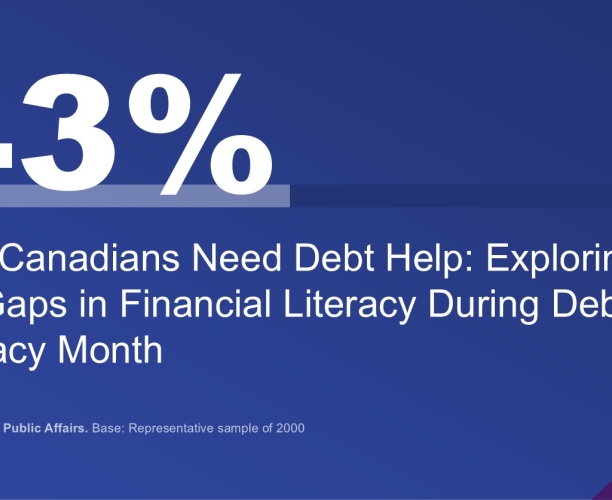

43% of Canadians Need Debt Help: Exploring the Gaps in Financial Literacy During Debt Literacy Month
Toronto, ON, Mar 3 2025 — March marks the inaugural Debt Literacy Month, an initiative aimed at educating Canadians about managing debt effectively. The campaign comes at a crucial time, as Ipsos survey data reveals significant gaps in financial literacy and debt management among certain demographic groups.
Many Need Help with their Debt
Debt and finances are top issues among many Canadians and to an extent, a sense of pride. As such, majority of Canadians agree there is no shame in seeking financial help with one’s debt (80%, -4 from 2019), and 43% of Canadians say they need help to get themselves out of debt. Furthermore, almost half say they would be embarrassed to seek help if their financial situation was bad enough to consider bankruptcy (48%, +2 from 2019) and four in ten agree there is a stigma of bankruptcy which prevents them from seeking help with their debt (40%, +9 from 2019). Additional reasons for avoiding financial help are that Canadians don’t believe their situation is serious enough to seek debt help (66%), or they are fearful of debt-relief scams (63%). On the other hand, a third (36%, +6 from 2019) of Canadians say they don’t know how to get out of debt or where to turn for help. However, while most Canadians agree there is no shame with seeking financial help, much fewer are willing to act on their own advice as 53% (+1 from 2019) say they have difficulty trusting professional companies to help them get out of debt.
When it comes to gender there are minimal differences except for men (43%) being more likely than women (37%) to agree the stigma of bankruptcy prevents them from seeking help with their debt. However, age plays a significant role in debt-related attitudes and behaviors. Younger Canadians ages 18-34 and 35-54 are more likely than those 55+ to have difficulty trusting professional debt help companies (62% & 60% vs 40%), feel embarrassed to seek help for bankruptcy (61% & 52% vs 34%), think they will never be debt-free (51% for both vs 34%), and need help getting out of debt (56% & 51% vs 27%).
Albertans have the highest rates of difficulty trusting debt professionals (58%), feeling stigmatized around bankruptcy (45%), and not knowing where to turn for debt help (40%). They are also more likely to need help getting out of debt (51%), feel overwhelmed (52%), and worried about scams (67%). Ontarians are also more likely than average to report needing debt help (49%), feeling overwhelmed (52%), and concerned about bankruptcy's impact on credit scores (59%).
Income is another important factor in debt challenges. Lower income Canadians, especially those earning under $40K, are more likely to have difficulties with debt. 56% of this group need help getting out of debt, compared to only 33% of those earning $100K+. Those earning under $40K are more likely to feel overwhelmed (53%), embarrassed (50%), think stigma prevents them from getting help (49%).
Financial Bad Habits are a Reality in Times of Financial Strain
While Canadians are torn on seeking help for their debt, in the past year, a quarter of Canadians (26%) have only paid the minimum payment towards the balance on their credit card, consistent with the last two Decembers. In addition, debt is building up as one in five Canadians skipped or delayed a bill payment (22%), went into further credit card debt this year (20%, -2) or have paid the minimum payment on their line of credit in the last year (17%, -2). To make ends meet, 18% of Canadians reported to have sold their personal belongings and some borrowed money they can’t afford to pay back quickly (16%, -2) which has put them deeper in debt.
Women are somewhat more likely than men to have engaged in certain concerning financial behaviors, such as paying only the minimum balance on credit cards (29% vs 22%), skipping or delaying bill payments (24% vs 19%), selling personal belongings to make ends meet (21% vs 16%), and increasing reliance on friends or family for financial support (18% vs 15%). However, men and women have similar rates of going further into credit card debt, borrowing unaffordable amounts, and making hardship withdrawals.
Age is a significant factor in financial habits. Canadians aged 18-34 and 35-54 are much more likely than those 55+ to have engaged in various risky financial behaviors over the past year. For example, 31% of 18-34 year olds and 32% of 35-54 year olds paid only the minimum on their credit cards, compared to just 16% of those 55+. Younger Canadians also have higher rates of skipping bills (27% of 18-34 & 28% of 35-54 vs 12% of 55+), selling belongings (23% & 24% vs 10%), paying only the minimum on lines of credit (17% & 24% vs 11%), borrowing unaffordable amounts (20% & 22% vs 9%), and increasing reliance on others financially (28% & 19% vs 6%).
Regional differences are also apparent. Ontarians have some of the highest rates of paying only credit card minimums (28%), going further into credit card debt (25%), selling belongings (21%), paying only the minimum on lines of credit (20%), borrowing unaffordable sums (21%), and increasing reliance on family/friends (20%). Albertans also have elevated rates of skipping bills (27%), selling belongings (25%), paying only the minimum on lines of credit (22%), and making hardship withdrawals (17%). Quebec and Atlantic Canada generally have lower rates of these financial difficulties.
Lower-income Canadians, especially those earning under $40K, are more likely to skip bills (27%), sell belongings to make ends meet (24%), increase reliance on family/friends for money (22%), spend to keep up with peers (10%), and rely on payday loans (12%). However, some concerning habits are common across income levels, such as paying only credit card minimums (23-30% across groups), going further into credit card debt (17-25%), and making major purchases on credit without paying right away (6-15%).
About the Study
These are some of the findings of an Ipsos poll conducted between December 6 – 17 2024, on behalf of MNP LTD. For this survey, a sample of 2,003 Canadians aged 18 years and over was interviewed. Weighting was then employed to balance demographics to ensure that the sample's composition reflects that of the adult population according to Census data and to provide results intended to approximate the sample universe. The precision of Ipsos online polls is measured using a credibility interval. In this case, the poll is accurate to within ±2.5 percentage points, 19 times out of 20, had all Canadian adults been polled. The credibility interval will be wider among subsets of the population. All sample surveys and polls may be subject to other sources of error, including, but not limited to coverage error, and measurement error.
For more information about the MNP Consumer Debt Index, please visit mnpdebt.ca/CDI.
For more information on this news release, please contact:
Sean Simpson
Senior Vice President, Canada, Public Affairs
[email protected]
Raymond Vuong
Account Manager, Canada, Public Affairs
[email protected]
About Ipsos
Ipsos is the world’s third largest market research company, present in 90 markets and employing more than 18,000 people.
Our passionately curious research professionals, analysts and scientists have built unique multi-specialist capabilities that provide true understanding and powerful insights into the actions, opinions and motivations of citizens, consumers, patients, customers or employees. We serve more than 5000 clients across the world with 75 business solutions.
Founded in France in 1975, Ipsos is listed on the Euronext Paris since July 1st, 1999. The company is part of the SBF 120 and the Mid-60 index and is eligible for the Deferred Settlement Service (SRD).
ISIN code FR0000073298, Reuters ISOS.PA, Bloomberg IPS:FP www.ipsos.com



